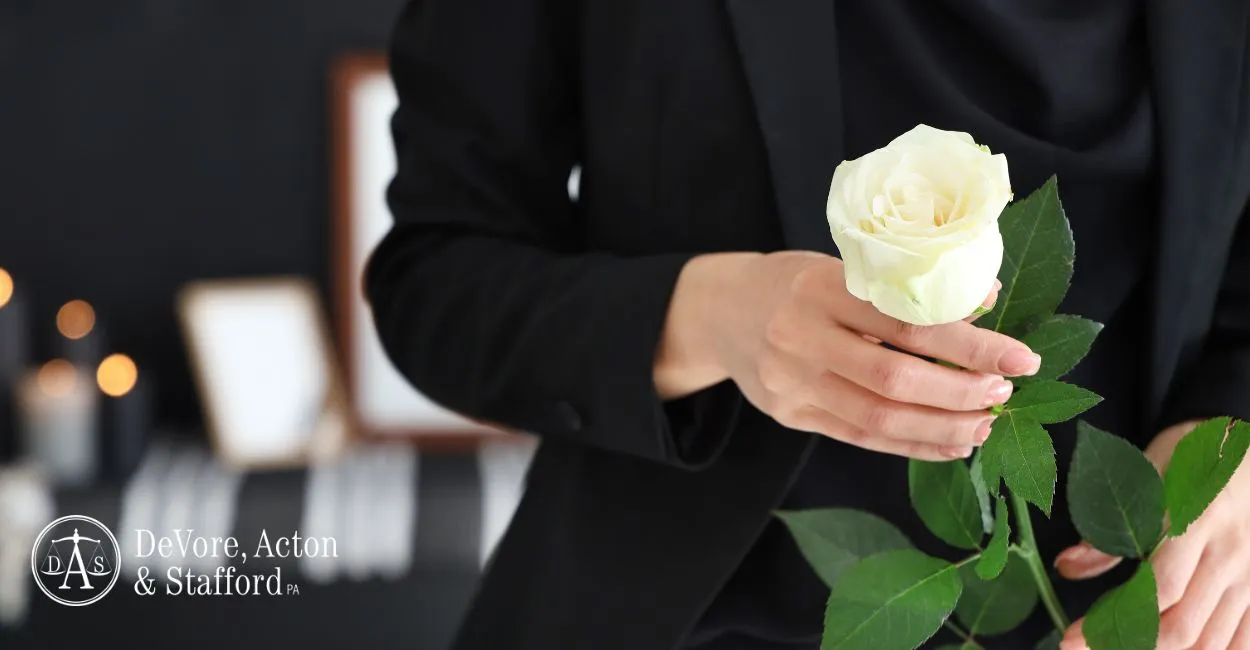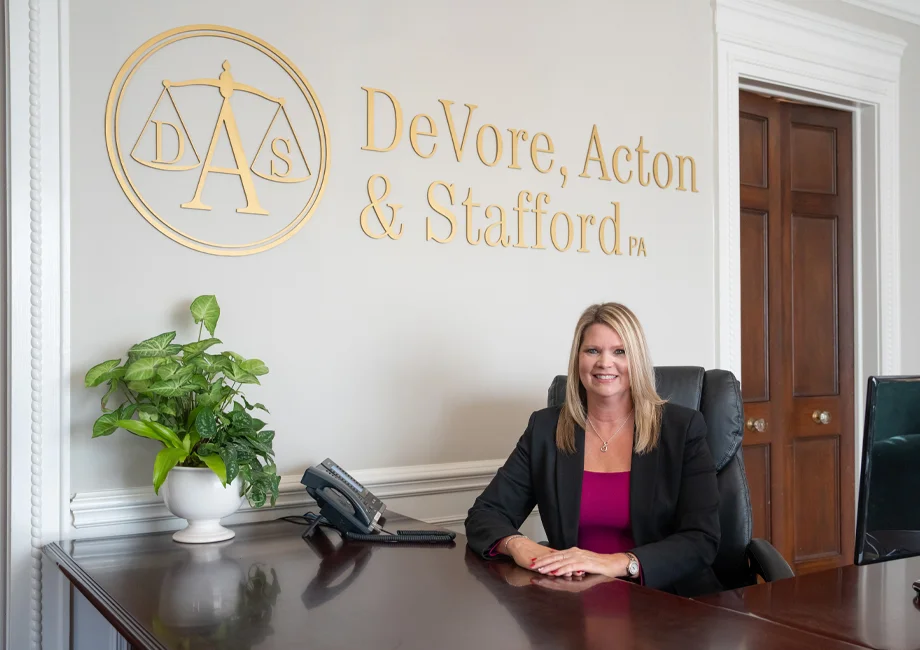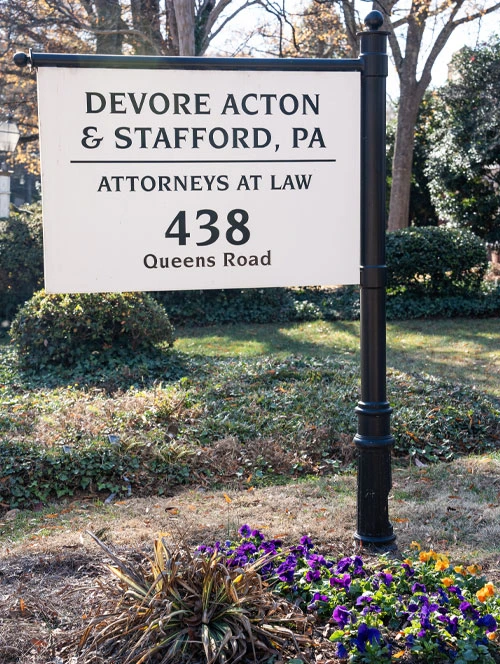South Carolina Wrongful Death Lawyer
South Carolina Wrongful Death Attorney
The emotional toll that the loss of a loved one can cause is never easy, but it can be even harder if the death happens due to a negligent or reckless act of another. If you lose a family member to negligence, malice, or the inaction of another person, you may be entitled to financial support. If you are unsure of how to proceed, you need to meet with a skilled South Carolina wrongful death lawyer.

Incidents That Can Lead to Wrongful Death in South Carolina
South Carolina law outlines wrongful death as a person who dies because of a negligent, reckless, or intentional act by another person or company. This can be from:
Car, Truck, and Motorcycle Accidents
Motor vehicle accidents such as car, trucks, and motorcycle accidents are a leading cause of wrongful death. Factors such as speeding, distracted driving, drunk driving, road rage, and other reckless behaviors behind the wheel can contribute to fatal crashes.
Boating Crashes
Boating accidents caused by operating the vessel recklessly, speeding, failing to maintain proper lookout, failing to follow regulations and safety guidelines, or operating it under the influence of alcohol or drugs may cause a wrongful death.
Medical Malpractice
Medical malpractice occurs due to negligence by healthcare or medical providers, such as doctors, nurses, surgeons, and hospitals. This negligence can result in surgical errors, leaving objects in the patient’s body, misdiagnosis, medication errors, and failure to provide appropriate medical care.
Workplace Accidents
Fatalities can happen in the workplace, especially in construction, manufacturing, and transportation. Lethal injuries can result from incidents like falls, electrocutions, machinery accidents, and exposure to hazardous substances.
Assisted Living Abuse or Negligence
Negligence or abuse in assisted living or long-term care facilities can lead to the wrongful death of elderly, disabled, or other vulnerable residents. This can arise from a neglect of medical needs, physical abuse, medication errors, or a failure to adequately supervise care providers.
Defective Products
Manufacturers, distributors, and sellers can be responsible for deaths caused by defective or dangerous products, such as faulty automobiles, medical devices, pharmaceuticals, and other consumer products.
Intentional Acts
Violent or illegal behavior, including assault, domestic violence, drunk driving, murder, or homicide, could become grounds for a wrongful death claim if these actions cause someone’s death.
Who Can File a Wrongful Death Claim?
The law in the state of South Carolina treats wrongful death claims like personal injury claims, meaning that they are filed by the decedent’s estate. This means that the executor, as named in a will or estate plan, must file the claim. If the decedent did not designate an executor, one will be appointed by the court.
At DeVore, Acton & Stafford, P.A., we can also help you handle estate administration and advise the executor throughout the entire probate process. We can file the initial inventory, provide notice to any creditors, and handle the estate’s bills.
Although the claim will be filed by the estate’s executor, the damages recovered will be awarded to the surviving family members, such as a spouse, children, parents, siblings, or any other heirs named in the will.
Damages That Can Be Recovered
After a successful wrongful death claim, the court will require the defendant to pay damages to the decedent’s surviving family members. These damages include:
Economic Damages
Economic damages cover the measurable losses that are incurred, and the goal is to help the surviving family members return to the financial position they were in before the loss. These include any medical expenses that the decedent incurred from their injuries or treatments before their death. Economic damages also encompass funeral expenses, along with the loss of financial support and future benefits.
Non-Economic Damages
Non-economic damages are immeasurable losses. They provide compensation for the physical pain, suffering, and mental anguish experienced by the decedent before their death and by their family.
Other non-economic damages include loss of consortium, meaning the loss of companionship, guidance, love, and support that the surviving family members would have received from the decedent.
Punitive Damages
If the incident involved particularly egregious or reckless conduct by the defendant, punitive damages may be awarded to punish them and deter similar misconduct in the future. This is a rare type of damages, and they are only awarded when the court finds it necessary.
Damage Limitations in South Carolina
While many states impose limitations, often called damage caps, on the monetary compensation that family members can receive from the non-economic damages in successful claims, South Carolina generally does not enforce any caps. There are exceptions, though.
The first limitation applies to a wrongful death from medical malpractice. If the death was caused by medical malpractice, the state restricts the total amount of non-economic damages that can be awarded. There is a maximum of $350,000 that can be penalized against a single medical provider. If there are multiple medical providers, the plaintiff can be awarded up to $1.05 million in total non-economic damages.
There is also a cap on punitive damages. The total amount of punitive damages cannot exceed three times the amount of non-economic and economic damages, or up to $500,000, whichever is greater. This includes all wrongful death cases, even if they involve medical malpractice.
Statute of Limitations in a Wrongful Death Claim
The statute of limitations in South Carolina states that claims must be filed within three years of the date of the person’s death. If no case is filed within that timeframe, the court will likely not hear it at all.
There may be exceptions to this three-year rule, depending on the circumstances of your case. In medical malpractice cases, you will have three years from the time of discovery to file a claim but not more than six years after the decedent’s treatment. Additionally, filings against the government may come with shorter deadlines. Consulting with a skilled wrongful death attorney can help you understand the complexities of the South Carolina statute of limitations.
Burden of Proof
In a wrongful death claim, the burden of proof rests with the plaintiff. This is done by proving these elements:
- The defendant has a legal duty of care towards the decedent. This will vary but usually means acting reasonably to avoid causing harm.
- There existed a relationship between the defendant and the decedent, such as having a contractual relationship (doctor-patient, employer-employee), legal obligation, or a general duty owed to the public (such as the duty to drive safely on public roads).
- It must be proven that the decedent died due to the incident outlined in the case. This means demonstrating that the defendant failed to act as a reasonable person or entity would have in similar circumstances.
- There is a connection between the defendant’s breach of duty and the death of the decedent.
This means that you and your legal representation need to establish these four elements with evidence, such as:
- Medical records, such as hospital records, doctor’s notes, test results, and autopsy reports, will document the decedent’s injuries, treatment received, and cause of death.
- Eyewitness testimony can provide valuable insight into what happened and corroborate your claim.
- Expert eyewitness testimony by medical professionals, accident reconstructionists, or forensic specialists can provide professional opinions about and analysis of the cause of death, the extent of the injuries, and other technical aspects.
- Photographs and videos of injuries sustained by the decedent can show their lethal extent.
- Documentation of financial loss, such as the decedent’s income, employment history, and other financial contributions to their family, can include pay stubs, tax returns, and employment records.
- Police reports and accident reconstruction can show how these injuries happened.
- Communication records between the parties involved can include emails, text messages, and phone calls.
- Documentation of a loss of consortium can show the loss of companionship, guidance, and support suffered by the family members. This can be demonstrated through letters, photographs, or the testimonies of family and friends.
- Other documentation can include insurance policies, contracts, or prior complaints or incidents made against the defendant.
FAQs
Q: Who Can Sue for Wrongful Death in South Carolina?
A: In South Carolina, wrongful death claims must be filed by the executor of the decedent’s estate. While the executor is required to initiate the claim, any damages recovered will be given to the beneficiaries, such as the surviving spouse, children, parents, or heirs. An attorney can help you determine if you are eligible to receive the awarded damages in a wrongful death claim.
Q: What Is the Statute of Limitations in South Carolina for Wrongful Death?
A: The statute of limitations in South Carolina for wrongful death claims is typically three years from the date of the person’s death. If it is not filed during this timeframe, the right to bring a claim may be barred. There are exceptions to the rule, so consulting with a wrongful death attorney can help explain how the law will work in your unique situation.
Q: What Damages Can Be Recovered in a Wrongful Death Claim?
A: The damages that can be recovered will depend on what losses are suffered by the person’s family members, but the most common types are funeral and medical expenses, lost wages and benefits, loss of consortium, and pain and suffering. In some rare cases, punitive damages can be awarded if the defendant was particularly negligent or malicious.
Q: How Can I Prove Wrongful Death?
A: To prove wrongful death, it must be shown that a death occurred as a result of the negligent, malicious, or intentional actions of another person. This is typically proven by you and your attorney, who must gather and present evidence, such as witness testimony, expert opinions, medical records, accident reports, and other documentation.
South Carolina Wrongful Death Lawyer
Let our South Carolina wrongful death lawyers support your family after the loss of a loved one. We can take the time to understand your situation with sympathy and skill. Then, we can fight for your rights. Contact us at DeVore, Acton & Stafford, P.A., for a consultation.

request your consultation
"*" indicates required fields



